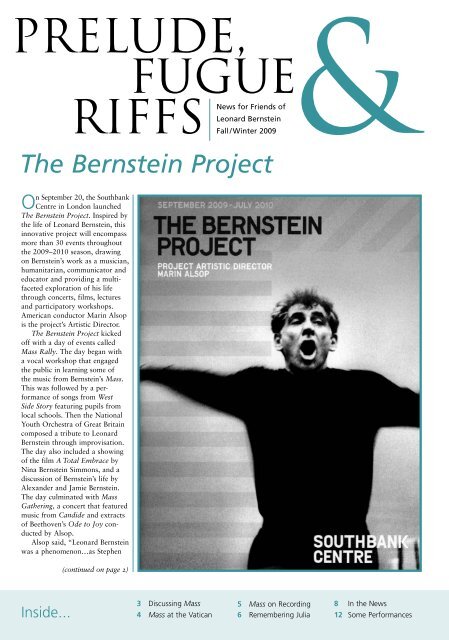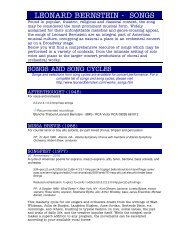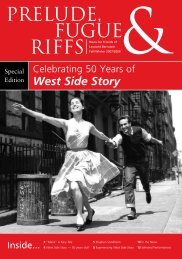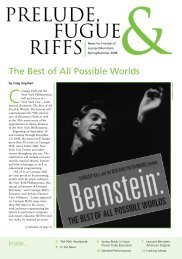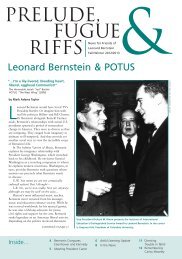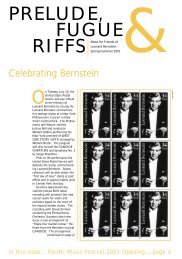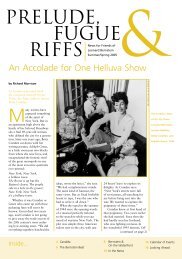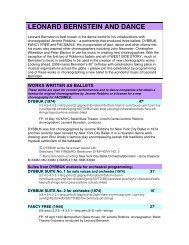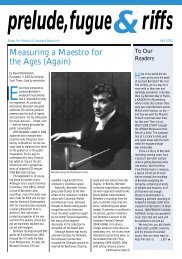The Bernstein Project - Leonard Bernstein
The Bernstein Project - Leonard Bernstein
The Bernstein Project - Leonard Bernstein
Create successful ePaper yourself
Turn your PDF publications into a flip-book with our unique Google optimized e-Paper software.
<strong>The</strong> <strong>Bernstein</strong> <strong>Project</strong><br />
On September 20, the Southbank<br />
Centre in London launched<br />
<strong>The</strong> <strong>Bernstein</strong> <strong>Project</strong>. Inspired by<br />
the life of <strong>Leonard</strong> <strong>Bernstein</strong>, this<br />
innovative project will encompass<br />
more than 30 events throughout<br />
the 2009–2010 season, drawing<br />
on <strong>Bernstein</strong>’s work as a musician,<br />
humanitarian, communicator and<br />
educator and providing a multifaceted<br />
exploration of his life<br />
through concerts, films, lectures<br />
and participatory workshops.<br />
American conductor Marin Alsop<br />
is the project’s Artistic Director.<br />
<strong>The</strong> <strong>Bernstein</strong> <strong>Project</strong> kicked<br />
off with a day of events called<br />
Mass Rally. <strong>The</strong> day began with<br />
a vocal workshop that engaged<br />
the public in learning some of<br />
the music from <strong>Bernstein</strong>’s Mass.<br />
This was followed by a performance<br />
of songs from West<br />
Side Story featuring pupils from<br />
local schools. <strong>The</strong>n the National<br />
Youth Orchestra of Great Britain<br />
composed a tribute to <strong>Leonard</strong><br />
<strong>Bernstein</strong> through improvisation.<br />
<strong>The</strong> day also included a showing<br />
of the film A Total Embrace by<br />
Nina <strong>Bernstein</strong> Simmons, and a<br />
discussion of <strong>Bernstein</strong>’s life by<br />
Alexander and Jamie <strong>Bernstein</strong>.<br />
<strong>The</strong> day culminated with Mass<br />
Gathering, a concert that featured<br />
music from Candide and extracts<br />
of Beethoven’s Ode to Joy conducted<br />
by Alsop.<br />
Alsop said, “<strong>Leonard</strong> <strong>Bernstein</strong><br />
was a phenomenon…as Stephen<br />
(continued on page 2)<br />
News for Friends of<br />
<strong>Leonard</strong> <strong>Bernstein</strong><br />
Fall / Winter 2009<br />
Inside...<br />
3 Discussing Mass<br />
4 Mass at the Vatican<br />
5 Mass on Recording<br />
6 Remembering Julia<br />
8 In the News<br />
12 Some Performances
<strong>The</strong> <strong>Bernstein</strong> <strong>Project</strong>, continued<br />
W<br />
hen asked which of his compositions<br />
was his favorite, <strong>Leonard</strong><br />
<strong>Bernstein</strong> would reply, “Oh, how<br />
can you ask me to choose among<br />
them? <strong>The</strong>y’re like my children!” But<br />
if pressed, he would confess that he<br />
held a special place in his heart for<br />
Mass, precisely because it was his most<br />
misunderstood piece — and perhaps<br />
also because it was his most deeply<br />
personal piece. Mass contains more<br />
of <strong>Bernstein</strong> than anything else he<br />
ever wrote. It has all the multiplicity<br />
of musical genres and breadth of<br />
language that he himself manifested.<br />
It has all his angst and irreverence<br />
and terror, all his tenderness and<br />
bombast and awe. At the time of<br />
Mass’ premiere, to inaugurate the<br />
Kennedy Center for the Performing<br />
Arts in 1971, the world wasn’t quite<br />
ready for such a rich broth of elements.<br />
But the world seems to have<br />
caught up to Mass, as is evident by<br />
the multiple productions, recordings<br />
and rave reviews that have recently<br />
sprouted up all over the globe.<br />
How gratifying to see Mass coming<br />
into its own: <strong>Bernstein</strong>’s troubled child<br />
embraced at long last.<br />
J.B. ■<br />
Sondheim once wrote about his<br />
friend: ‘Poor Lenny...10 gifts<br />
too many...’ <strong>Bernstein</strong> wrote hit<br />
musicals like West Side Story<br />
and a great film score to On the<br />
Waterfront; he composed profound<br />
music, serious music, and<br />
He was a thinker, teacher,<br />
author, television star,<br />
provocateur, humanitarian<br />
and he was my hero.<br />
– Marin Alsop<br />
hysterically funny light music; he<br />
conducted every great orchestra in<br />
the world and brought the Mahler<br />
Symphonies back to the Vienna<br />
Philharmonic; he was a champion<br />
at word games and puzzles and<br />
loved finding errors in the Oxford<br />
English Dictionary! He was a<br />
thinker, teacher, author, television<br />
star, provocateur, humanitarian<br />
and he was my hero. As with all<br />
true mentors, <strong>Bernstein</strong> taught me<br />
much more than a craft. On a personal<br />
level, he gave me the courage<br />
to be myself. And on a wider level,<br />
I watched him interact with young<br />
people and professional orchestras,<br />
constantly mentoring, constantly<br />
giving. He showed me — and the<br />
world — the enormous power of<br />
music and how important it is to<br />
share it with as much of humanity<br />
as is possible. He showed us that<br />
classical music is a powerful force<br />
that can transform lives as well as<br />
inspire and move people and he<br />
lived by those principles.”<br />
<strong>The</strong> <strong>Bernstein</strong> <strong>Project</strong> will<br />
include a season of films curated<br />
by <strong>Bernstein</strong> biographer and former<br />
head of BBC TV’s Music and<br />
Arts, Humphrey Burton. Some of<br />
the films to be screened include<br />
<strong>The</strong> Little Drummer Boy, a controversial<br />
90-minute film essay<br />
on Mahler’s Jewish Heritage; and<br />
Ode to Freedom, a performance<br />
of Beethoven’s Ninth Symphony<br />
in Berlin, celebrating the fall of<br />
the Berlin Wall 20 years ago on<br />
Christmas Day 1989.<br />
<strong>The</strong>re will be concerts by<br />
Southbank Centre’s Resident<br />
Orchestras, the London<br />
Philharmonic Orchestra<br />
and the Orchestra of the Age<br />
of Enlightenment, as well as by<br />
visiting ensembles, the Bournemouth<br />
Symphony Orchestra and the Nash<br />
Ensemble. <strong>The</strong>re will also be a West<br />
Side Story sing-along screening.<br />
<strong>The</strong> <strong>Project</strong> will conclude with<br />
Alsop conducting performances of<br />
<strong>Bernstein</strong>’s Mass, on July 10 and<br />
11, 2010. Performing forces will<br />
include a cast of young dancers<br />
and musicians from London and a<br />
specially-assembled Mass Orchestra<br />
led by members of the National<br />
Youth Orchestra, all of whom<br />
commence rehearsals with Alsop,<br />
Matthew Barley and Mary King in<br />
Spring 2010.<br />
For more information: http://<br />
bernstein.southbankcentre.co.uk/ ■<br />
© WALTER SCOTT<br />
Prelude, Fugue & Riffs Fall/Winter 2009<br />
<strong>Leonard</strong> <strong>Bernstein</strong> and Marin Alsop<br />
2
Discussing Mass<br />
Music critic Edward Seckerson<br />
and conductor Marin Alsop<br />
discuss Mass. This discussion<br />
is from a larger article about<br />
Marin Alsop that appeared in<br />
Gramophone Magazine.<br />
© WALTER SCOTT<br />
Does Marin Alsop think it’s<br />
a masterpiece? E.S.<br />
“Yes, because for <strong>Bernstein</strong><br />
nothing was ever perfect. For<br />
him there was no such thing. He<br />
rejoiced in the rough edges of<br />
spontaneity in everything he did.<br />
Mass is a piece that can and does<br />
weather human frailty.” M.A.<br />
Just as well. It is extraordinarily<br />
challenging to perform<br />
and in her new Naxos recording<br />
(the work’s fourth), Alsop went<br />
to exceptional lengths to achieve<br />
an authentic mix of performers<br />
with a keen understanding of the<br />
style. With a little help from Leslie<br />
Stifelman a friend at the sharp<br />
end of musical theatre — that is<br />
the Music Director on Kander<br />
and Ebb’s “Chicago” in New<br />
York — some 300 young hopefuls<br />
auditioned for the all-important<br />
“street singers” at the heart of<br />
Mass. <strong>The</strong>y have to be the real<br />
thing; the range of what is required<br />
of them is wild. <strong>The</strong>se aren’t pop<br />
songs, these are far-out-there art<br />
songs. Challenging sentiments,<br />
still more challenging vocals. E.S.<br />
“Mass is a microcosm<br />
of <strong>Bernstein</strong>’s<br />
personality. If you<br />
doubt its sincerity,<br />
if you deny its<br />
integrity, then you<br />
deny everything<br />
<strong>Bernstein</strong> was.”<br />
<strong>Leonard</strong> <strong>Bernstein</strong> and Marin Alsop<br />
Mass polarizes opinions, Mass<br />
divides as surely as it unites. But<br />
Alsop thinks, as do I, that the<br />
open hostility that comes at it from<br />
some quarters stems from a refusal<br />
to accept the validity of different<br />
musics and cultures co-existing.<br />
Which, in short, says more about<br />
the naysayers than it does about<br />
the piece. E.S.<br />
“You know, what’s interesting<br />
about Mass is just how<br />
prophetic it’s turned out to be.<br />
All those boundaries between<br />
genres, between different styles<br />
of music — they’re gone — and<br />
it may have been less threatening<br />
to some had they remained<br />
in place, but they didn’t. Besides,<br />
the level of sophistication is dazzling<br />
throughout. Tell me that<br />
the 11-tone second Meditation,<br />
impregnated as it is with allusions<br />
to Beethoven’s Ode to Joy, is not a<br />
touch of genius.” M.A.<br />
“A cornucopia of genius poured<br />
out with no restraint” was how<br />
<strong>The</strong> New York Times summed-up<br />
the musical values of Mass. Alsop<br />
goes further: “Mass is a microcosm<br />
of <strong>Bernstein</strong>’s personality. If you<br />
doubt its sincerity, if you deny<br />
its integrity, then you deny everything<br />
<strong>Bernstein</strong> was.” E.S.<br />
So, was <strong>Bernstein</strong> the<br />
eternal optimist or the ever<br />
hopeful pessimist? E.S.<br />
“I don’t know. It tended to be<br />
one or the other. But I think what<br />
makes Mass so very special is that<br />
it accepts our limitations as human<br />
beings and somehow transcends<br />
them. <strong>The</strong> ultimate message falls<br />
into ‘the eternal optimist’ camp,<br />
in that it says — you know, we are<br />
going to be ok...” M.A.<br />
<strong>Bernstein</strong>’s own doubts ran<br />
deep. In that last interview he<br />
gave me he expressed regret that<br />
so many of his peers had never<br />
embraced his music. Did Alsop, I<br />
wonder, agree that those musical<br />
excursions into thorny overgrown<br />
paths (his dabblings with atonality<br />
in pieces like Jubilee Games) were,<br />
to some extent, an attempt to gain<br />
him entrance into a club to which<br />
he didn’t quite belong? E.S.<br />
(continued on page 5)<br />
Prelude, Fugue & Riffs Fall/Winter 2009<br />
3
Mass at the Vatican<br />
by Boris Brott<br />
In February of 2000, I was<br />
invited to conduct <strong>Leonard</strong><br />
<strong>Bernstein</strong>’s Mass at the Vatican.<br />
I was excited. I was very close<br />
to this work, having served as<br />
<strong>Bernstein</strong>’s assistant at the New<br />
York Philharmonic while he was<br />
writing it.<br />
After its premiere in 1971, the<br />
Catholic Church criticized the<br />
commentary “tropes” <strong>Bernstein</strong><br />
interjected between the movements<br />
of the Latin Mass, proclaiming<br />
them blasphemous. He was<br />
deeply hurt. He saw Mass as an<br />
expression of his ultimate rationalization<br />
of faith through doubt.<br />
<strong>Bernstein</strong> had just experienced<br />
and had been very moved by the<br />
Talmudic process of helping his<br />
son Alexander with instruction<br />
for his Bar Mitzvah. He couldn’t<br />
understand why the Church did<br />
not view Mass as he intended.<br />
So this invitation, nearly 30<br />
years after Mass’ birth, offered<br />
a magnificent opportunity to<br />
realize my mentor’s dream: Mass<br />
at the Vatican!<br />
Simple? Well, not really. I called<br />
Harry Kraut, <strong>Bernstein</strong>’s manager,<br />
who at first was delighted. We<br />
© Stefan Meier<br />
spent over an hour on the phone.<br />
I went to bed with the music I<br />
knew so well ringing in my ears.<br />
Next morning, a phone call<br />
from Harry. No, you cannot do it!<br />
Why? Well, in truth, a book could<br />
be written about how it eventually<br />
came to pass. But let me cite one<br />
example: how do you break a<br />
chalice and a monstrance and spill<br />
the wine (blood of Christ) on the<br />
ground...in the VATICAN?<br />
<strong>The</strong> problems melted away.<br />
Costumes and the rending of the<br />
Celebrant’s robes — permitted. No<br />
dancing, but natural movement to<br />
the music — permitted. No properties<br />
(chalice, monstrance) allowed<br />
but the actions could be mimed.<br />
An excellent cast, assembled<br />
around Celebrant Douglas Webster,<br />
rehearsed at <strong>The</strong> Juilliard School<br />
and flew to Rome where the<br />
14,000 seat Aula Nervi was transformed<br />
into a theatre. <strong>The</strong> altar<br />
steps became a multi-level stage,<br />
the giant sculpture of Christ ascendant<br />
became part of the staging.<br />
At the performance <strong>Bernstein</strong>’s<br />
spirit was in the room — you could<br />
feel his presence. 400 red-zuchetted<br />
Bishops filled the front rows. <strong>The</strong><br />
14,000 invited guests sat in reverence<br />
as Douglas began Simple Song<br />
and we were under way.<br />
At the Papal audience the following<br />
morning, Pope John Paul II<br />
took my hand in his and told me<br />
it was important this work was<br />
performed at the Vatican. “It is<br />
a confirmation of faith through<br />
life’s great trials” he said with the<br />
intensity of his cornflower blue<br />
eyes. As he said this, I thought of<br />
<strong>Bernstein</strong> and knew at last this<br />
great Mass had assumed its rightful<br />
place at the Vatican.<br />
■<br />
Prelude, Fugue & Riffs Fall/Winter 2009<br />
4<br />
Douglas Webster as the Celebrant<br />
Boris Brott is Conductor and<br />
Music Director of the New West<br />
Symphony in California; the McGill<br />
Chamber Orchestra in Montreal,<br />
Canada; the National Academy<br />
Orchestra of Canada; and Principal<br />
Youth and Family Conductor of the<br />
National Arts Center of Canada. He<br />
is also Artistic Director of the Brott<br />
Musical Festivals, Ontario’s principal<br />
classical orchestra music festival.
Mass on Recording<br />
After a long hiatus, two<br />
new recordings of <strong>Leonard</strong><br />
<strong>Bernstein</strong>’s Mass have appeared<br />
this year. <strong>The</strong> first recording of<br />
Mass appeared on Sony in 1971<br />
conducted by the composer<br />
himself, the recording featured<br />
Alan Titus, who created the role<br />
of the Celebrant, as well as, the<br />
Norman Scribner Choir and<br />
<strong>The</strong> Berkshire Boy Choir. This<br />
recording was, for many years,<br />
the only recording of the work.<br />
Peter G. Davies writing for High<br />
Fidelity Magazine wrote of it,<br />
“Columbia’s recording is a<br />
faithful replica of the Washington<br />
production in almost all particulars<br />
and the spirit of the piece<br />
comes across vividly.”<br />
In 2004, Kent Nagano made<br />
the second recording of the work<br />
for Harmonia Mundi with the<br />
Deutsches Symphonie Orchester<br />
Berlin, featuring the late Jerry<br />
Hadley singing the role of the<br />
Celebrant. Writing for Classics<br />
Today David Hurwitz wrote,<br />
“if you love <strong>Bernstein</strong>’s Mass,<br />
you should hear this performance.<br />
It’s very exciting…”<br />
On one of the new recordings,<br />
Kristjan Järvi leads the<br />
Tonkunstler-Orchester and<br />
the Absolute Ensemble, with<br />
Randall Scarlata as the Celebrant.<br />
Gramophone Magazine wrote<br />
about this Chandos recording,<br />
“For a work that was much<br />
derided by some as much as it<br />
was adored by others upon its<br />
premiere, <strong>Bernstein</strong>’s Mass seems<br />
now to be a modern classic. This<br />
new recording is likely to be a<br />
powerful advocate in its widespread<br />
reassessment. Kristjan Järvi<br />
conducts his many and varied<br />
forces with high-octane energy.”<br />
Later in the year, Naxos<br />
released its recording of Mass<br />
with <strong>The</strong> Baltimore Symphony<br />
Orchestra, Morgan State Choir,<br />
Peabody Children’s Chorus,<br />
and with Jubilant Sykes as the<br />
Celebrant, all under the baton of<br />
<strong>Bernstein</strong> protégé Marin Alsop.<br />
<strong>The</strong> Toronto Star wrote, “This<br />
new, two-CD recording by a<br />
cast of hundreds gives Mass its<br />
full due. <strong>The</strong> main singing role,<br />
a priest who loses his faith and<br />
then finds it again, is magnificently<br />
sung by baritone Jubilant<br />
Sykes. <strong>The</strong> same holds true for<br />
the rest of the singers — the<br />
Morgan State University Choir, the<br />
Peabody Children’s Chorus, and<br />
sweet-voiced boy soprano Asher<br />
Edward Wulfman. <strong>The</strong> Baltimore<br />
Symphony Orchestra, augmented<br />
by guitar and percussion, finds the<br />
right cutting edge under Marin<br />
Alsop’s baton.”<br />
In addition to the new audio<br />
recordings, Kultur Video has<br />
released a DVD of the Mass performance<br />
at the Vatican.<br />
■<br />
Discussing Mass, continued<br />
“Yes and no. I really think it<br />
was sheer curiosity and the need<br />
to stretch himself, musically and<br />
intellectually, that took him off<br />
on those experimental paths.<br />
He loved the gamesmanship<br />
of composition and sometimes<br />
the game gets better the more<br />
constraints you put on it. As<br />
you know, he premiered and<br />
championed his mentor Aaron<br />
Copland’s big twelve-tone piece<br />
Connotations, and he did so<br />
because he passionately identified<br />
with Copland’s curiosity. In<br />
a sense, twelve-tone music was<br />
symbolic for him. It represented<br />
a conflict that required some<br />
kind of resolution.” M.A.<br />
Just so. Only <strong>Bernstein</strong> could<br />
pull a torch song out of a tonerow.<br />
Perhaps the problem with<br />
his music in our lifetime was our<br />
inability to get any distance from<br />
it. Alsop cites John Corigliano<br />
who firmly believes that no one<br />
can judge a composer’s work until<br />
the composer is dead. E.S.<br />
More importantly, the music is<br />
his. And with that in mind, I go<br />
back to the transcripts of a 1989<br />
interview <strong>Bernstein</strong> gave me. <strong>The</strong>se<br />
words leap out at me: “I’m not really<br />
needed on this Earth for another<br />
Ring Cycle, or another Magic Flute,<br />
or another whatever. Really. But<br />
nobody, for better or worse, can<br />
write my music except me. E.S.<br />
“Particularly, a composer like<br />
<strong>Bernstein</strong>, whose work was so<br />
irrevocably bound-up in who he<br />
was. Everyone was influenced, for<br />
better, for worse, by the persona<br />
of Lenny and it was that, rather<br />
than the quality of the music, that<br />
led to the skepticism and derision.<br />
Used by permission of<br />
Gramophone Magazine.<br />
For the complete article please<br />
visit: http://www.gramophone.<br />
net/Issue/Page/August%20<br />
2009/36/1002073/A<br />
■<br />
<strong>The</strong> music is brilliant...” M.A. 5<br />
Prelude, Fugue & Riffs Fall/Winter 2009
Remembering Julia<br />
by Jamie <strong>Bernstein</strong><br />
Julia Vega, longtime<br />
<strong>Bernstein</strong> family governess<br />
and housekeeper, died on<br />
June 7th of complications<br />
from stomach surgery.<br />
Raised on a farm in the<br />
foothills of the Chilean Andes,<br />
Julia came to work for our<br />
family in 1954, when the eldest<br />
of us was just two. Julia helped<br />
raise all three <strong>Bernstein</strong> children,<br />
filling in both as nanny and<br />
housekeeper when our parents<br />
were abroad. She acquired excellent<br />
English speaking and reading<br />
skills, eventually becoming a U.S.<br />
citizen, a proud voter and an<br />
avid follower of national politics.<br />
After our mother’s death in<br />
1978, Julia became our father’s<br />
live-in housekeeper. After he died<br />
in 1990, Julia acquired the role<br />
of elder-in-chief of the <strong>Bernstein</strong><br />
family. At our new family headquarters<br />
on West 56th Street,<br />
where various friends and relatives<br />
dropped by daily, Julia held<br />
a kind of inverse court, making<br />
indelible friendships with all<br />
who passed through our doors<br />
through her unique combination<br />
of attentive service, charming<br />
conversation and delicious,<br />
nourishing soups. Her friends<br />
traversed all walks of society,<br />
from the building doormen to<br />
Peter Jennings.<br />
Julia was renowned for her discretion.<br />
Had she chosen, she could<br />
have written the ultimate tell-all<br />
about the myriad luminaries who<br />
came through the <strong>Bernstein</strong> household<br />
over the years. But she took<br />
her secrets with her. Above all, she<br />
was a fierce defender of familial<br />
privacy in a world of persistent<br />
public scrutiny.<br />
Julia has been our ground of<br />
being: like water to a fish, like air<br />
to a bird. It is very hard for us to<br />
imagine life without her, since we<br />
have never known such a thing.<br />
But harder still to imagine<br />
is that Julia Vega — governess,<br />
housekeeper, kitchen whiz, faithful<br />
friend and beloved great-aunt,<br />
letter-writer, birdkeeper, news<br />
junkie, prodigious horticulturalist,<br />
seamstress and laundress extraordinaire<br />
— is now, finally,<br />
incomprehensibly, at rest. Surely the<br />
most well-deserved rest we know. ■<br />
Julia Vega with Jamie and<br />
Alexander <strong>Bernstein</strong><br />
Julia Vega with Nina <strong>Bernstein</strong><br />
© RICHARD AVEDON<br />
COURTESY NINA BERNSTEIN<br />
Prelude, Fugue & Riffs Fall/Winter 2009<br />
6<br />
Julia Vega was a devoted<br />
parishioner at the Church of<br />
Street. Francis de Sales on East<br />
96th Street, directly across the<br />
street from her small apartment<br />
where she spent her days<br />
off since the 1950s.<br />
In her final years, Julia experienced<br />
increasing difficulty in<br />
climbing the steep marble steps<br />
to the church sanctuary. For<br />
this reason, Nina, Alexander<br />
and I have initiated a fund in<br />
Julia’s memory, to install a vertical<br />
platform lift at the church<br />
entrance, so that no parishioner<br />
at St. Francis de Sales will ever<br />
again have to struggle to enter<br />
and worship. Construction has<br />
commenced this fall.<br />
Those who wish to contribute to<br />
the Julia Vega Memorial Stairway<br />
to Heaven (as we like to call it)<br />
can make donations in her name<br />
to the <strong>Leonard</strong> <strong>Bernstein</strong> Family<br />
Foundation, 121 West 27th Street,<br />
suite 1104, New York, NY 10001. ■
Taking <strong>Bernstein</strong> to Venezuela<br />
by Jamie <strong>Bernstein</strong><br />
It’s never a simple matter to go<br />
to Caracas. <strong>The</strong> city is chaotic,<br />
choked with traffic and bursting<br />
at the seams with poverty. But<br />
music lovers still think of it as<br />
a privilege to brave the inconvenience<br />
in exchange for witnessing<br />
— and with extra luck, being<br />
a part of — the miracle that is<br />
El Sistema, Venezuela’s unique<br />
music education program that has<br />
enrolled over 300,000 children<br />
in orchestras across that nation,<br />
and has produced, among other<br />
world-class musicians, the Los<br />
Angeles Philharmonic’s new Music<br />
Director, Gustavo Dudamel.<br />
On this trip, I had that extra<br />
luck to be a participant. I was<br />
invited to narrate my youth<br />
concert, <strong>The</strong> <strong>Bernstein</strong> Beat, en<br />
español, with one of El Sistema’s<br />
extraordinary youth orchestras,<br />
Orquesta Sinfónica Juvenil de<br />
Caracas, conducted by a dynamic<br />
young Venezuelan, Dietrich<br />
Paredes. Maestro Dietrich worked<br />
the orchestra hard to master the<br />
complexities of excerpts from<br />
On the Town, Fancy Free<br />
and West Side Story. I was so<br />
impressed by the teenagers’ focus<br />
and good humor. By the end of<br />
the week, they were playing the<br />
music like champs.<br />
<strong>The</strong> concert went beautifully,<br />
with only one glitch — painfully<br />
enough, right at the beginning.<br />
For some reason the clarinet player,<br />
who had never had this trouble<br />
before, added one extra note to<br />
the series of repeated notes he<br />
plays at the opening of the Times<br />
Square ballet from Three Dance<br />
Episodes from On the Town,<br />
thereby putting himself one disastrous<br />
beat behind the rest of the<br />
orchestra. After an 8-bar train<br />
wreck, Maestro Dietrich stopped<br />
the players, waited for the clarinet<br />
player to collect himself, and<br />
then started the piece over. <strong>The</strong><br />
same thing happened. Maestro<br />
Dietrich stopped the orchestra,<br />
again. I sat motionlessly on my<br />
stool to Maestro Dietrich’s left,<br />
trembling in my high heels. <strong>The</strong><br />
hall was engulfed in a sickening<br />
silence. Maestro Dietrich<br />
started the music again. And<br />
the clarinet player did it a third<br />
time. This time the conductor just<br />
kept everyone going, and things<br />
eventually righted themselves,<br />
but it was a tough start for one<br />
and all — especially, of course,<br />
for the clarinet player, who never<br />
raised his head again and fled<br />
offstage the moment the concluding<br />
note of the concert was<br />
Jamie <strong>Bernstein</strong> and Jose Antonio Abreu<br />
played. Between the final bows,<br />
just offstage, Maestro Dietrich<br />
was frantically looking for him.<br />
“Donde está Antonio? Donde está<br />
Antonio?” But Antonio was gone.<br />
<strong>The</strong> concert was a great success;<br />
the kids in the audience<br />
shouted “MAMBO!” for all they<br />
were worth. Afterwards, Maestro<br />
José Antonio Abreu, the saint-like<br />
founder of El Sistema, embraced<br />
me and invited me to return to<br />
Venezuela to present more concerts.<br />
I was as thrilled as if I’d<br />
been blessed by the Dalai Lama.<br />
After the concert, there was<br />
a lunch in a hotel dining room<br />
for Maestro Dietrich and me and<br />
our guests, plus some Sistema<br />
officials and members of the youth<br />
orchestra. We’d been sitting a few<br />
minutes when suddenly the musicians<br />
burst into applause: Antonio<br />
the clarinet player had walked in.<br />
<strong>The</strong> musicians all jumped up from<br />
the table and surrounded him with<br />
hugs, back slaps, jokes and words<br />
of encouragement. He half-jokingly<br />
covered his face in embarrassment,<br />
but of course resistance was futile,<br />
and he was soon smiling and<br />
returning the hugs.<br />
I watched all this with my<br />
mouth open and my eyes filling<br />
with tears. I had never in all<br />
my life seen such a magnificent<br />
demonstration of support and<br />
compassion for a fellow musician<br />
in trouble. Truly, this was the<br />
essence of El Sistema. As one<br />
representative of the organization<br />
said afterwards: “We don’t build<br />
musicians; we build human beings.”<br />
It will be exciting indeed if<br />
El Sistema succeeds in finding<br />
its way into the neighborhoods<br />
and hearts of young people in<br />
the United States.<br />
■<br />
© JEFFREY STOCK<br />
Prelude, Fugue & Riffs Fall/Winter 2009<br />
7
<strong>Leonard</strong> <strong>Bernstein</strong> Award<br />
<strong>Leonard</strong> Eischenbroich receiving the prize<br />
© Axel Nickolaus<br />
<strong>The</strong> Schleswig Holstein Music<br />
Festival has presented the<br />
10,000 Euro <strong>Leonard</strong> <strong>Bernstein</strong><br />
Award to cellist <strong>Leonard</strong><br />
Eischenbroich. <strong>The</strong> award is<br />
given to young artists at the<br />
beginning of careers to enable<br />
them to pursue performing.<br />
Previous recipients are Lang<br />
Lang, Lisa Batiashvili, Erik<br />
Schumann, Jonathan Biss, Alisa<br />
Weilerstein, Martin Grubinger<br />
and Anna Vinnitskaya.<br />
Eischenbroich has performed<br />
with international orchestras<br />
under such conductors as Semyon<br />
Bychkov, Christoph Eschenbach<br />
and Paavo Järvi. He has performed<br />
chamber music with violinists<br />
Gidon Kremer and Anne-Sophie<br />
Mutter. As a recitalist, <strong>Leonard</strong><br />
has performed with pianists<br />
Anna Vinnitskaya, Marc-André<br />
Hamelin, Martin Helmchen and<br />
Polina Leschenko.<br />
Born in 1985 in Frankfurt,<br />
<strong>Leonard</strong> was invited at the age<br />
of 10 to study at the Yehudi<br />
Menuhin School in London. He<br />
finished his degree at the Music<br />
College of Cologne. He held a<br />
Fellowship at the Royal Academy<br />
of Music in London and is<br />
currently a fellow at the Trinity<br />
College of Music in London.<br />
<strong>The</strong> award is made possible<br />
by the generosity of the<br />
Sparkassen Finanzgruppe. ■<br />
<strong>Leonard</strong> <strong>Bernstein</strong> Excellence Award<br />
Prelude, Fugue & Riffs Fall/Winter 2009<br />
<strong>The</strong> University of North<br />
Carolina School of the Arts<br />
(UNCSA) has presented this year’s<br />
<strong>Leonard</strong> <strong>Bernstein</strong> Excellence Award<br />
to James Baron Fenwick III. <strong>The</strong><br />
school’s Chancellor John Mauceri<br />
created this award with the authorization<br />
of <strong>The</strong> <strong>Leonard</strong> <strong>Bernstein</strong><br />
Office. It will be awarded annually<br />
to a music student at UNCSA<br />
who is talented and demonstrates<br />
a commitment to bettering society<br />
in the same spirit as <strong>Leonard</strong><br />
<strong>Bernstein</strong>. Fenwick, 15, is a pianist<br />
and a violist. Mauceri has called<br />
him “absolutely inspirational.” ■<br />
Chancellor John Mauceri and James Baron Fenwick III<br />
Courtesy uncsa<br />
8
Historic OMNIBUS Programs Return on DVD<br />
For the first time since their<br />
live broadcast a half-century<br />
ago, <strong>Leonard</strong> <strong>Bernstein</strong>’s legendary<br />
appearances on the historic<br />
Omnibus television series will<br />
return to the public this December.<br />
E1 Entertainment, in collaboration<br />
with the National<br />
Academy of Television Arts and<br />
Sciences under its “Archives of<br />
American Television” banner, will<br />
release the seven newly-restored<br />
programs as a four-DVD set.<br />
<strong>Bernstein</strong>’s Omnibus programs<br />
earned him a national reputation<br />
and formed the basis of<br />
his best-selling book <strong>The</strong> Joy of<br />
Music. <strong>The</strong>y also feature his 1954<br />
television debut at the age of 36,<br />
Beethoven’s Fifth Symphony, an<br />
examination of the force that<br />
compels creative artists. Other<br />
titles address <strong>The</strong> World of Jazz,<br />
<strong>The</strong> Art of Conducting, American<br />
Musical Comedy, his Introduction<br />
to Modern Music, <strong>The</strong> Music of<br />
J.S. Bach (a Grammy winner), and<br />
What Makes Opera Grand? As a<br />
bonus, the DVD set also includes<br />
a rare performance of Handel’s<br />
Messiah, with <strong>Bernstein</strong> conducting<br />
from the harpsichord.<br />
Omnibus, produced by Robert<br />
Saudek Associates, was an initiative<br />
of the Ford Foundation and<br />
aired over commercial network<br />
television from 1952 to 1961.<br />
<strong>The</strong> New York Times dubbed its<br />
executive producer Robert Saudek<br />
“the alchemist-in-chief of what<br />
is often called the golden age of<br />
television,” adding that he “gave<br />
the era of live television some<br />
of its most elevating and electrifying<br />
moments.”<br />
In a 1993 article for <strong>The</strong><br />
Atlantic Monthly, David Schiff<br />
said of <strong>Bernstein</strong>’s Omnibus<br />
presentations, “I am startled<br />
again and again at the subtlety<br />
and sophistication of the lessons<br />
<strong>Bernstein</strong> chose to teach…I have<br />
never witnessed better teaching,<br />
anywhere…<strong>The</strong> Omnibus shows<br />
illuminated music like a pillar<br />
of fire.”<br />
■<br />
<strong>Leonard</strong> <strong>Bernstein</strong>: <strong>The</strong> Political Life<br />
of an American Musician<br />
<strong>The</strong> University of California<br />
Press has published <strong>Leonard</strong><br />
<strong>Bernstein</strong>: <strong>The</strong> Political Life of<br />
an American Musician by Barry<br />
Seldes. In this examination of<br />
<strong>Bernstein</strong>’s political life, Seldes<br />
examines his career against the<br />
backdrop of Cold War America,<br />
during which time <strong>Bernstein</strong><br />
was blacklisted by the State<br />
Department and, in 1950, had<br />
to sign a deposition to regain his<br />
passport. Making extensive use<br />
of FBI files as well as materials in<br />
the Library of Congress, Seldes<br />
illuminates the ways in which<br />
<strong>Bernstein</strong>’s career intersected with<br />
some of the twentieth century’s<br />
most momentous events.<br />
■<br />
Prelude, Fugue & Riffs Fall/Winter 2009<br />
9
<strong>Leonard</strong> <strong>Bernstein</strong> Scholar-in-Residence<br />
Thomas Hampson<br />
© Dario Acosta<br />
American baritone Thomas<br />
Hampson has been named<br />
the <strong>Leonard</strong> <strong>Bernstein</strong> Scholarin-Residence<br />
at the New York<br />
Philharmonic for the 2009–2010<br />
season in conjunction with his<br />
role as <strong>The</strong> Mary and James<br />
G. Wallach Artist-in-Residence.<br />
Hampson will present two Insight<br />
Series events, as well as the Annual<br />
Erich Leinsdorf Lecture in a series<br />
entitled “Listening to Thought,”<br />
exploring the interplay of verbal and<br />
musical languages in vocal music.<br />
“Thomas Hampson truly<br />
combines his artistry with probing<br />
scholarship,” says <strong>The</strong>odore<br />
Wiprud, Director of Education<br />
at the New York Philharmonic.<br />
“His intellectual curiosity informs<br />
everything he does, whether it’s<br />
singing Schubert or exploring the<br />
riches and cultural connections of<br />
American song. As a performer,<br />
Hampson brings an exciting<br />
new dimension to the Scholarin-Residence<br />
position and to<br />
the many speaking events he<br />
will lead.”<br />
<strong>The</strong> <strong>Leonard</strong> <strong>Bernstein</strong><br />
Scholar-in-Residence position at<br />
the New York Philharmonic<br />
honors and recognizes the enduring<br />
contributions of <strong>Leonard</strong><br />
<strong>Bernstein</strong>. It was created in the<br />
2005–2006 season to coincide<br />
with the 15th anniversary of<br />
<strong>Bernstein</strong>’s death. Charles Zachary<br />
Bornstein served as the first<br />
<strong>Leonard</strong> <strong>Bernstein</strong> Scholar-in-<br />
Residence, from 2005–2006<br />
through 2007–2008. New York<br />
Philharmonic Program Annotator<br />
James M. Keller served in this<br />
post in the 2008–2009 season. ■<br />
Flanders Celebrates <strong>Bernstein</strong><br />
Prelude, Fugue & Riffs Fall/Winter 2009<br />
This September, deFilharmonie<br />
(Royal Flemish Philharmonic)<br />
launched a year-long celebration<br />
of the music of <strong>Leonard</strong> <strong>Bernstein</strong><br />
in Antwerp and Bruges. <strong>The</strong><br />
launch began with Jukebox<br />
<strong>Bernstein</strong>, an evening devoted to<br />
discussion of the life and work<br />
of <strong>Bernstein</strong> featuring Craig<br />
Urquhart, former assistant to<br />
<strong>Leonard</strong> <strong>Bernstein</strong>; Ludo Abicht,<br />
philosopher; and host Fred<br />
Browers. Concerts in both cities<br />
throughout the season will<br />
include Serenade, Divertimento,<br />
Symphonic Dances from West<br />
Side Story and Symphony No.3:<br />
Kaddish. Participating conductors<br />
are Mikhail Agrest, Sir Peter<br />
Maxwell Davies, Paul Watkins<br />
and Yutaka Sado. Soloists will<br />
be Laurent Korcia, violin; Kelly<br />
Naisieff, soprano and Samuel<br />
Pisar, speaker. In addition to<br />
the symphonic concerts, the<br />
Concertgebouw Bruges will<br />
present <strong>The</strong> Unforgettable Songs<br />
of <strong>Leonard</strong> <strong>Bernstein</strong> featuring<br />
Clarion McFadden and<br />
Chichester Psalms with the<br />
Flemish Radio Chorus.<br />
This season the Vlaamse<br />
Opera will present seven performances<br />
of Candide in Antwerp<br />
and five performances in Ghent.<br />
This production will be directed<br />
by Nigel Lowery and conducted<br />
by Yannis Pouspourikas and<br />
will feature Michael Spyres<br />
as Candide, Jane Archibald<br />
as Cunnegonde and Graham<br />
Valentine as Pangloss/Martin.<br />
For more information:<br />
http://www.vlaamseopera.be<br />
http://www.defilharmonie.be ■<br />
10
Trouble in Tahiti: A New<br />
Reduced Orchestration<br />
© Wilfried Hösl<br />
by Garth Edwin Sunderland<br />
T<br />
rouble in Tahiti is a brilliant<br />
pastiche of pop music and<br />
melodrama, showing <strong>Bernstein</strong> at<br />
his most bitingly ironic, and yet,<br />
at the same time, most personal<br />
and sincere. Ranging from the<br />
jingle-like crooning of the vocal<br />
trio to major, show-stopping<br />
serio-comic arias for main characters<br />
Sam and Dinah, the music<br />
pulls out every pop-cultural<br />
1950’s stop, while never losing<br />
sight of the genuine pathos of its<br />
characters: a couple in a troubled<br />
marriage, desperate to find the<br />
way back to that “Quiet Place”<br />
of their love for one another.<br />
A 50-minute, one-act opera,<br />
with a small cast of 5 and minimal<br />
staging requirements, Trouble<br />
in Tahiti is ideal for small venues<br />
and small companies, but a tricky<br />
obstacle has always been its<br />
orchestra — at a bare minimum<br />
of 26 players (assuming only a<br />
string quintet rather than the<br />
preferred full string sections), it<br />
is just a little too big to comfortably<br />
fit in many of the small halls<br />
that might otherwise be ideal<br />
venues for it.<br />
When Kent Nagano came to<br />
us last year inquiring about<br />
options for fitting the opera<br />
into the Cuvillies <strong>The</strong>atre of the<br />
Bayerische Staatsoper in Munich<br />
(a lovely-but-tiny jewel of Baroque<br />
Rococo, where Mozart’s Idomeneo<br />
had its premiere), it seemed the<br />
perfect opportunity to address this<br />
issue, and create a reduced orchestration<br />
that might allow the work<br />
a wider variety of homes.<br />
It was with great pleasure<br />
that I undertook to create this<br />
new orchestration. It was my<br />
primary goal throughout the<br />
project to maintain a strict fealty<br />
to <strong>Bernstein</strong>’s original intentions,<br />
and for presenters of the new<br />
orchestration not to have to feel<br />
that they were compromising by<br />
performing it. <strong>The</strong> reduction takes<br />
a ‘one of each’ chamber orchestra<br />
approach, with an 14–15 piece<br />
instrumentation of 1.1.1.1–1.1.1.0–<br />
Perc (1 or 2 players)–Pno–1.1.1.1.1.<br />
<strong>The</strong> premiere performance on<br />
July 7, with Maestro Nagano<br />
conducting the Mahler Chamber<br />
Orchestra, was a great success,<br />
launching a sold-out run. It was<br />
very gratifying to hear a number<br />
of people comment that they<br />
Scene from Trouble in Tahiti, Bayerische Staatsoper<br />
didn’t even notice that the orchestra<br />
had been reduced! While this<br />
orchestration cannot be a true<br />
substitute for <strong>Bernstein</strong>’s brilliant<br />
original, I hope that it might allow<br />
Trouble in Tahiti to find an even<br />
wider reach, and allow more<br />
performers and audiences the<br />
chance to experience this hilarious,<br />
exuberant melancholy opera. ■<br />
Garth Edwin Sunderland is<br />
a composer and interdisciplinary<br />
artist. He is Artistic Director of<br />
the Lost Dog New Music Ensemble,<br />
and Music Editor for the <strong>Leonard</strong><br />
<strong>Bernstein</strong> Office.<br />
<strong>Leonard</strong> <strong>Bernstein</strong> Center Update<br />
by Alexander <strong>Bernstein</strong><br />
<strong>The</strong> <strong>Leonard</strong> <strong>Bernstein</strong> Center<br />
for Learning’s Artful Learning<br />
model continues expanding,<br />
reaching new teachers, students<br />
and communities across the<br />
country. We welcome Wright<br />
Elementary and Howe Elementary<br />
in Des Moines, Iowa, Midway<br />
Elementary in Sanford, Florida,<br />
and Comeaux High School in<br />
Lafayette, Louisiana.<br />
With the superior leadership<br />
and collaboration of Patrick<br />
Bolek, the LBC’s trainers are carrying<br />
forward <strong>Leonard</strong> <strong>Bernstein</strong>’s<br />
educational vision with truly<br />
remarkable commitment, skill and<br />
imagination. My father would be<br />
beyond proud of this work. ■<br />
Prelude, Fugue & Riffs Fall/Winter 2009<br />
11
For a complete listing visit:<br />
www.leonardbernstein.com<br />
Prelude, Fugue & Riffs Fall/Winter 2009<br />
12<br />
October<br />
2 Antwerp, Belgium: SERENADE;<br />
deFilharmonie; Laurent Korcia; violin;<br />
Mikhail Agrest, conductor; Desingel.<br />
6–9 Hyogo, Japan: OVERTURE TO CANDIDE;<br />
Hyogo Performing Arts Center Orchestra;<br />
Chikara Iwamura, conductor; Hyogo<br />
Performing Arts Center.<br />
9,10 Charlotte, NC: THREE DANCE EPISODES<br />
FROM ON THE TOWN; Charlotte Symphony<br />
Orchestra; Chelsea Tipton II, conductor;<br />
Blumenthal Performing Arts Center.<br />
11 Berlin, Germany: CHICHESTER PSALMS;<br />
Berliner Domkantorei, Sinfonieorchester<br />
Schöneberg; Stanley Dodds, conductor;<br />
Philharmonie.<br />
14 Linz, Austria: SYMPHONY NO.1:<br />
JEREMIAH; Bruckner Orchester Linz;<br />
Kathryn Handsaker, mezzo-soprano; Dennis<br />
Russell Davies, conductor; Brucknerhaus.<br />
17–19 Portland, OR: SYMPHONY NO.2:<br />
THE AGE OF ANXIETY; Oregon Symphony;<br />
Kirill Gerstein, piano; Carlos Kalmar;<br />
conductor; Arlene Schnitzer Concert Hall.<br />
21,22 Salzburg, Austria: MASS;<br />
Junge Philharmonie Salzburg;<br />
Florianer Sångerknabe; Studierende de<br />
Mozarteum; Vox cantabilis Bis; John<br />
Cashmore, Celebrant; Elisabeth Fuchs,<br />
conductor; Elisabethkirche.<br />
27,28 Hyogo, Japan: OVERTURE TO CANDIDE;<br />
Hyogo Performing Arts Center Orchestra;<br />
Chik Naohiro Totsuka, conductor;<br />
Hyogo Performing Arts Center.<br />
November<br />
3 Leipzig, Germany: SYMPHONIC<br />
DANCES FROM WEST SIDE STORY;<br />
MDR Sinfonieorchester, Fabrice Bollon,<br />
conductor; Gewandhaus.<br />
4,5, Dresden, Germany: CANDIDE (Scottish<br />
12 Opera Version); Staatsoperette Dresden;<br />
Windried Schneider, director; Ernst<br />
<strong>The</strong>is Staasoperette.<br />
5 Louisville, KY: THREE DANCE VARIATIONS<br />
FROM FANCY FREE; Louisville Orchestra;<br />
Jorge Mester, conductor; Whitney Hall.<br />
7 Berlin, Germany: CHICHESTER PSALMS;<br />
Berliner Domkantorei, Sinfonieorchester<br />
Schöneberg; Stanley Dodds, conductor;<br />
Berliner Dom.<br />
7 Storrs, CT: SYMPHONY NO.1: JEREMIAH;<br />
SERENADE; Bruckner Orchester Linz;<br />
Kathryn Handsaker, mezzo-soprano;<br />
Renaud Capiçon, violin; Dennis Russell<br />
Davies, conductor; Jorgensen Center.<br />
10 Winston-Salem, NC: SYMPHONIC<br />
DANCES FROM WEST SIDE STORY; Bruckner<br />
Orchester Linz; Dennis Russell Davies,<br />
conductor; Wait Chapel Auditorium.<br />
11 Chapel Hill, NC: SYMPHONIC DANCES<br />
FROM WEST SIDE STORY; Bruckner<br />
Orchester Linz; Dennis Russell Davies,<br />
conductor; Memorial Hall.<br />
12–15 Evanston, IL: MASS; Northwestern<br />
University School of Music; Ryan Nelson,<br />
Music Director; Cahn Auditorium.<br />
13 Jacksonville, FL: SYMPHONY NO.1:<br />
JEREMIAH; SERENADE, SYMPHONIC<br />
DANCES FROM WEST SIDE STORY;<br />
Bruckner Orchester Linz; Kathryn<br />
Handsaker, mezzo-soprano; Renaud<br />
Capiçon, violin; Dennis Russell Davies,<br />
conductor; Lazzara Performance Hall.<br />
14 Daytona Beach, FL: SYMPHONY NO.1:<br />
JEREMIAH; SERENADE, SYMPHONIC<br />
DANCES FROM WEST SIDE STORY;<br />
Bruckner Orchester Linz; Kathryn<br />
Handsaker, mezzo-soprano; Renaud<br />
Capiçon, violin; Dennis Russell Davies,<br />
conductor; Peabody Auditorium.<br />
16 Charleston, SC: SYMPHONY NO.1:<br />
JEREMIAH; SERENADE, SYMPHONIC<br />
DANCES FROM WEST SIDE STORY;<br />
Bruckner Orchester Linz; Kathryn<br />
Handsaker, mezzo-soprano; Renaud<br />
Capiçon, violin; Dennis Russell Davies,<br />
conductor; Peabody Auditorium.<br />
19,20, Atlanta, GA: PRELUDE, FUGUE AND RIFFS;<br />
22 Atlanta Symphony Orchestra; Laura Ardan,<br />
clarinet; Robert Spano, conductor; Atlanta<br />
Symphony Hall.
20 Antwerp, Belgium: DIVERTIMENTO;<br />
deFilharmonie; Sir Peter Maxwell Davies,<br />
conductor; Desingel.<br />
21 Bruges, Belgium: DIVERTIMENTO;<br />
deFilharmonie; Sir Peter Maxwell Davies,<br />
conductor; Concertgebouw.<br />
21,24, Hildesheim, Germany: ON THE TOWN;<br />
25 Orchester des Stadttheaters Hildesheim;<br />
Craig Simmons, director; Manfred Knaak,<br />
conductor; Stadttheater.<br />
December<br />
1,13, Hildesheim, Germany: ON THE TOWN;<br />
31 Orchester des Stadttheaters Hildesheim;<br />
Craig Simmons, director; Manfred Knaak,<br />
conductor; Stadttheater.<br />
3–5 Naples, FL: THREE DANCE VARIATIONS<br />
FROM FANCY FREE; Naples Philharmonic<br />
Orchestra; Jorge Mester, conductor;<br />
Hayes Hall.<br />
4 Vienna, Austria: SYMPHONY NO.2:<br />
THE AGE OF ANXIETY; Radio<br />
Symphonieorchester Wien;<br />
Andres Haefliger, piano; Hugh Wolff,<br />
conductor; Konzerthaus.<br />
4–6 San Diego, CA: MASS; La Jolla<br />
Symphony and Chorus; Ken Anderson,<br />
Celebrant; Steve Schick, conductor;<br />
Mandeville Auditorium.<br />
4,6, Dessau, Germany: CANDIDE (Scottish<br />
10,20 Opera version); Cordula Däuper,<br />
director; Daniel Carlberg, musical<br />
director; Anhaltisches <strong>The</strong>atre.<br />
12 Hamburg, Germany: PRELUDE, FUGUE<br />
AND RIFFS; NDR Sinfonieorchester;<br />
John Axelrod, conductor; Kampnagel.<br />
15,17, Dessau, Germany: CANDIDE (Scottish<br />
22,20, Opera version); Cordula Däuper, director;<br />
29 Daniel Carlberg, musical director;<br />
Anhaltisches <strong>The</strong>atre.<br />
31 Dayton, OH: GLITTER AND BE GAY;<br />
Dayton Symphony Orchestra;<br />
Laura Portune, soprano; Neal Gittleman,<br />
conductor; Schuster Center.<br />
January<br />
4–6 Bremerhaven, Germany: SYMPHONIC<br />
DANCES FROM WEST SIDE STORY;<br />
Stådtisches Orchester Bremerhaven;<br />
Stephen Tetzlaff, conductor; Stadttheater.<br />
6 Oberndorf, Austria: OVERTURE TO<br />
CANDIDE; Schüler Orchester Bremerhaven;<br />
Reinhold Wieser, conductor; Stadthalle.<br />
7 Sophia, Bulgaria: CHICHESTER PSALMS;<br />
Amateurorchester; Ljubka Biagioni zu<br />
Guttenberg, conductor; Saal Bulgaria.<br />
9 Dessau, Germany: CANDIDE (Scottish Opera<br />
version); Cordula Däuper, director; Daniel<br />
Carlberg, musical director; Anhaltisches <strong>The</strong>atre.<br />
9,12, Ghent, Beligium: CANDIDE; Symphony<br />
14,15, Orchestra and Choir the Vlaamse Oper;<br />
17,20, Nigel Lowery, director; Yannis Pouspourikas,<br />
27,29, conductor; Ghent Oper.<br />
10,11 Hannover, Germany: SYMPHONIC<br />
SUITE FROM ON THE WATERFRONT;<br />
Niedersächsisches Staatsorchester;<br />
Christian Muthspiel, conductor; Staatsoper.<br />
11 Reutlingen, Germany: SYMPHONIC<br />
SUITE FROM ON THE WATERFRONT;<br />
Württembergische Philharmonie Reutlingen;<br />
Marc Tardue, conductor; Friedrich List Halle.<br />
13,26 Hildesheim, Germany: ON THE TOWN;<br />
Orchester des Stadttheaters Hildesheim;<br />
Craig Simmons, director; Manfred Knaak,<br />
conductor; Stadttheater.<br />
15 Heidelberg, Germany: OVERTURE<br />
TO CANDIDE; Akademische<br />
Philharmonie Heidelberg; Jesko Sirvend,<br />
conductor; Stadthalle.<br />
16 Seattle, WA: OVERTURE TO WEST<br />
SIDE STORY; Seattle Symphony;<br />
Carolyn Kuan, conductor; S. Mark Taper<br />
Foundation Auditorium.<br />
21 Neuhausen, Germany: SERENADE; BR<br />
Münchner Rundfunkorchester; Ulf Schirmer,<br />
conductor; Herz Jesu Kirche.<br />
22 Luxembourg, Luxembourg: CLARINET<br />
SONATA; Emil Johnson, clarinet; Peter Friis<br />
Johansson, piano; Philharmonie, Salle de<br />
Musique de Chambre.<br />
22 Munich, Germany: SERENADE;<br />
BR Münchner Rundfunkorchester;<br />
Ulf Schirmer, conductor; Funkhaus.<br />
Prelude, Fugue & Riffs Fall/Winter 2009<br />
13
Prelude, Fugue & Riffs Fall/Winter 2009<br />
14<br />
26,29 Görlitz, Germany: PRELUDE, FUGUE<br />
AND RIFFS; Neue Lausitzer Philharmonie;<br />
Nicola Jürhensen, clarinet; Eckehard Stier,<br />
conductor; <strong>The</strong>ater.<br />
27 Hoyerswerda, Germany: PRELUDE,<br />
FUGUE AND RIFFS; Neue Lausitzer<br />
Philharmonie; Nicola Jürhensen, clarinet;<br />
Eckehard Stier, conductor; Lausitzhalle.<br />
28 Bautzen, Germany: PRELUDE, FUGUE<br />
AND RIFFS; Neue Lausitzer Philharmonie;<br />
Nicola Jürhensen, clarinet; Eckehard Stier<br />
conductor; <strong>The</strong>ater.<br />
28 Dessau, Germany: CANDIDE (Scottish<br />
Opera version); Cordula Däuper,<br />
director; Daniel Carlberg, musical<br />
director; Anhaltisches <strong>The</strong>atre.<br />
28,29 Dresden, Germany: CANDIDE<br />
(Scottish Opera Version); Staatsoperette<br />
Dresden; Windried Schneider, director;<br />
Ernst <strong>The</strong>is Staasoperette.<br />
28–30 Washington, DC: THREE DANCE<br />
EPISODES FROM ON THE TOWN;<br />
National Symphony Orchestra;<br />
Ivan Fischer, conductor; Kennedy Center.<br />
29 Bruges, Beligium: THE UNFORGETABLE<br />
SONGS OF LEONARD BERNSTEIN;<br />
Clarian McFadden, singer; Concertgebouw.<br />
29–31 Oxnard, CA: OVERTURE TO CANDIDE;<br />
New West Symphony, Boris Brott,<br />
conductor; Oxnard Performing Arts Center.<br />
29,30 Ludwigshafen, Germany: WEST<br />
SIDE STORY CONCERT SUITE NO.1;<br />
Deutsche Staatsphilharmonie Rheinland<br />
Pfalz; Sean Newhouse, conductor;<br />
BASF Feierhabendhaus.<br />
30 Zittau, Germany: PRELUDE, FUGUE<br />
AND RIFFS; Neue Lausitzer Philharmonie;<br />
Nicola Jürhensen, clarinet; Eckehard Stier,<br />
conductor; <strong>The</strong>ater.<br />
31 Kamenz, Germany: PRELUDE, FUGUE<br />
AND RIFFS; Neue Lausitzer Philharmonie;<br />
Nicola Jürhensen, clarinet; Eckehard Stier,<br />
conductor; <strong>The</strong>ater.<br />
February<br />
5 Antwerp, Belgium: SYMPHONIC DANCES<br />
FROM WEST SIDE STORY; deFilharmonie,<br />
Paul Watkins, conductor; Desingel.<br />
6 Bruges, Belgium: SYMPHONIC DANCES<br />
FROM WEST SIDE STORY; deFilharmonie,<br />
Paul Watkins, conductor; Concergebouw.<br />
6 Baden-Baden, Germany: OVERTURE<br />
TO CANDIDE, ORCHESTRAL SUITE FROM<br />
CANDIDE; Mahler Chamber Orchestra;<br />
Kristjan Järvi, conductor; Festspielhaus.<br />
6,19, Hildesheim, Germany: ON THE TOWN;<br />
20 Orchester des Stadttheaters Hildesheim;<br />
Craig Simmons, director; Manfred Knaak,<br />
conductor; Stadttheater.<br />
8–9 Gelsenkirchen, Germany: SYMPHONIC<br />
DANCES FROM WEST SIDE STORY; Neue<br />
Philharmonie Westfalen; Heiko Mathias<br />
Förster, conductor; Zeche Hibernia.<br />
10,11 Chemnitz, Germany: SYMPHONY NO.1:<br />
JEREMIAH; Robert Schumann Philharmonie;<br />
Tina Penttinen, soprano; Domonkos Heja,<br />
conductor; Stadhalle, Grosser Saal.<br />
14 Dessau, Germany: CANDIDE (Scottish<br />
Opera version); Cordula Däuper,<br />
director; Daniel Carlberg, musical<br />
director; Anhaltisches <strong>The</strong>atre.<br />
19–21 Sarasota, FL: THREE DANCE EPISODES<br />
FROM ON THE TOWN; Sarasota Orchestra;<br />
Leif Bjaland, conductor; Neel Performing<br />
Art Center.<br />
20 Chemnitz, Germany: SYMPHONY NO.3:<br />
KADDISH, (Premiere of a new ballet);<br />
SERENADE (Premiere of new ballet);<br />
Ballett der Städtischen <strong>The</strong>ater Chemnitz;<br />
Lode Devos, choreographer; <strong>The</strong>ater.<br />
20 Hannover, Germany: ON THE TOWN;<br />
Orchester des Stadttheaters Hildesheim;<br />
Craig Simmons, director; Manfred Knaak,<br />
conductor; <strong>The</strong>ater am Aegi.<br />
20,21 Dresden, Germany: CANDIDE<br />
(Scottish Opera Version); Staatsoperette<br />
Dresden; Windried Schneider, director;<br />
Ernst <strong>The</strong>is Staasoperette.<br />
21 Würzburg, Germany: CHICHESTER<br />
PSALMS; Hofer Symphoniker; Dorothea<br />
Völker, conductor; St. Johanneskirche.<br />
21 Pittsburg, PA: THREE DANCE EPISODES<br />
FROM ON THE TOWN; Pittsburgh<br />
Symphony Orchestra; <strong>Leonard</strong> Slatkin,<br />
conductor; Heinz Hall.<br />
26–28 Albuquerque, NM: CHICHESTER PSALMS;<br />
New Mexico Symphony Orchestra and<br />
Chorus; Michael Nesterowicz, conductor;<br />
Popejoy Hall.
March<br />
3,5, Hildesheim, Germany: ON THE TOWN;<br />
7,27 Orchester des Stadttheaters Hildesheim;<br />
Craig Simmons, director; Manfred Knaak,<br />
conductor; Stadttheater.<br />
4 London, UK: SYMPHONIC DANCES FROM<br />
WEST SIDE STORY; London Symphony<br />
Orchestra; Kristjan Järvi, conductor;<br />
Barbican Hall.<br />
12–14 Albuquerque, NM: SYMPHONY NO.2:<br />
THE AGE OF ANXIETY; New Mexico<br />
Symphony Orchestra; Norman Krieger,<br />
piano; Guillermo Figueroa, conductor;<br />
Popejoy Hall.<br />
18 Baton Rouge, LA: SYMPHONIC DANCES<br />
FROM WEST SIDE STORY; Baton Rouge<br />
Symphony Orchestra; Timothy Muffitt,<br />
conductor; River Center <strong>The</strong>atre for the<br />
Performing Arts.<br />
18,19 Tucson, AZ: CHICHESTER PSALMS,<br />
CANDIDE SELECTIONS FOR PERFORMANCE;<br />
Tucson Symphony Orchestra; George<br />
Hanson, conductor; Tucson Music Hall.<br />
19,21, Nancy, France: TROUBLE IN TAHITI<br />
23,25, (Original orchestral version) (New production);<br />
26 Ensemble and Choir de l’Opéra national<br />
Lorraine, Orchestre symphonique et<br />
lyrique de Nancy; Benoît Bénichou,<br />
director; Jonathan Schiffman, conductor;<br />
Opéra Nancy.<br />
20 Bruges, Belgium: CHICHESTER PSALMS;<br />
Vlaams Radio Chor; Bo Holton, conductor;<br />
Concergebouw.<br />
21 Köln, Germany: CLARINET SONATA;<br />
Emil Jonason, clarinet; Peter Friis Johansson,<br />
piano; Philharmonie.<br />
26,28 Portland, OR: TROUBLE IN TAHITI<br />
(Original orchestral version); Portland<br />
Opera; Mic Muni, director; Robert Ainsley,<br />
conductor; <strong>The</strong> Hampton Opera Center.<br />
27 North Bethesda, MD: CHICHESTER<br />
PSALMS; National Philharmonic; Stan<br />
Engebretson, conductor; Music Center<br />
at Strathmore.<br />
27 Garmisch-Partenkirchen, Germany:<br />
THREE DANCE EPISODES FROM ON THE<br />
TOWN; Nordwestdeutsche Philharmonie;<br />
Ivan Meylemans, conductor; Kongresshaus.<br />
27,28 Des Moines, IA: OVERTURE TO CANDIDE;<br />
Des Moines Symphony Orchestra; Joseph<br />
Giunta; Civic Center of Greater Des Moines.<br />
April<br />
1,3 Portland, OR: TROUBLE IN TAHITI<br />
(Original orchestral version); Portland Opera;<br />
Mic Muni, director; Robert Ainsley, conductor;<br />
<strong>The</strong> Hampton Opera Center.<br />
3 Cottbus, Germany: CANDIDE (Scottish<br />
Opera version); Staatstheater Cottbus;<br />
Wolfgang Lchnitt, director; Marc Niemann;<br />
conductor; Staatstheater.<br />
5 Dessau, Germany: CANDIDE (Scottish Opera<br />
version); Cordula Däuper, director; Daniel<br />
Carlberg, musical director; Anhaltisches <strong>The</strong>atre.<br />
8,11, Hildesheim, Germany: ON THE TOWN;<br />
12,15, Orchester des Stadttheaters Hildesheim;<br />
30 Craig Simmons, director; Manfred Knaak,<br />
conductor; Stadttheater.<br />
10 Regina, SK, Canada: OVERTURE TO<br />
CANDIDE; Regina Symphony; Victor Sawa;<br />
conductor; Conexus Arts Center.<br />
11 Gelsenkirchen, Germany: TROUBLE IN TAHITI;<br />
Musiktheater im Revier; MIR Jungendorchester;<br />
Carsten Kirchmeier, director; Clemens Jungling,<br />
conductor; Musiktheater im Revier.<br />
13 Berlin, Germany: SYMPHONIC DANCES FROM<br />
WEST SIDE STORY; Deutsche Symphonie Orchester<br />
Berlin; Eva Ollikainen, conductor; Philharmonie.<br />
19 Seattle, WA: SYMPHONIC DANCES FROM<br />
WEST SIDE STORY; Seattle Symphony Orchestra;<br />
Dennis Russell Davies, conductor; S. Mark Taper<br />
Foundation Auditorium.<br />
21 Essen, Germany: SYMPHONIC DANCES FROM<br />
WEST SIDE STORY; Orchestre National de France;<br />
Kurt Masur, conductor; Alfried Krupp Saal.<br />
Prelude, Fugue & Riffs will be<br />
sent upon request. Please send<br />
all correspondence to:<br />
Craig Urquhart<br />
Prelude, Fugue & Riffs<br />
121 West 27th Street<br />
Suite 1104<br />
New York, NY 10001<br />
Fax: (212) 315-0643<br />
e-mail:<br />
curquhart@leonard bernstein.com<br />
We appreciate notice of any<br />
performances or events featuring<br />
the music of <strong>Leonard</strong> <strong>Bernstein</strong><br />
or honoring his creative life<br />
and we shall do our best to<br />
include such information in<br />
forthcoming calendars.<br />
Prelude, Fugue & Riffs TM is<br />
a publication of <strong>The</strong> <strong>Leonard</strong><br />
<strong>Bernstein</strong> Office, Inc.<br />
© 2009 by <strong>The</strong> <strong>Leonard</strong><br />
<strong>Bernstein</strong> Office, Inc.<br />
Managing Editor: Craig Urquhart<br />
Editors: Jack Gottlieb,<br />
Jamie <strong>Bernstein</strong><br />
Design: BorsaWallace, NYC<br />
Visit our website:<br />
www.leonardbernstein.com<br />
Prelude, Fugue & Riffs Fall/Winter 2009<br />
15
121 West 27th Street<br />
Suite 1104<br />
New York, NY 10001<br />
PRESORTED<br />
STANDARD<br />
U.S. POSTAGE PAID<br />
NEWARK, NJ<br />
PERMIT NO. 625<br />
Printed on recycled paper<br />
New Releases<br />
Sony Classical has released a<br />
twelve-CD set of all of the<br />
recordings of the music of Haydn<br />
that <strong>Bernstein</strong> made with the<br />
New York Philharmonic. This<br />
box set includes the 12 London<br />
Symphonies, 6 Paris Symphonies,<br />
Die Schöpfung, Harmoniemesse,<br />
Missa in Tempore Belli, Missa<br />
in Augustiis, Nelsonmesse and<br />
<strong>The</strong>resienmesse. Also released<br />
by Sony CD is <strong>Bernstein</strong>’s historic<br />
recording of Strauss’ Die<br />
Rosenkavalier with Christa<br />
Ludwig, Gwyneth Jones, Lucia<br />
Popp, Walter Berry, Placido<br />
Domingo and the Vienna<br />
Philharmonic. In addition Sony<br />
released a new box set of the<br />
complete Mahler symphonies<br />
recorded by <strong>Bernstein</strong> with the<br />
New York Philharmonic.<br />
Medici Arts had released<br />
two DVDs: <strong>Leonard</strong> <strong>Bernstein</strong><br />
Reflections, a film by Peter<br />
Rosen, and Ode to Freedom. In<br />
Reflections, <strong>Bernstein</strong> discusses his<br />
Boston childhood and his musical<br />
growth at Harvard and the Curtis<br />
Institute, and shares thoughts<br />
about his musical mentors. Ode to<br />
Freedom is a special commemorative<br />
edition of <strong>Bernstein</strong>’s historic<br />
performance of Beethoven’s Ninth<br />
Symphony, celebrating the reunification<br />
of Germany and the fall of<br />
the Berlin Wall.<br />
Naxos Records has released<br />
a new critically acclaimed<br />
recording of Mass with Marin<br />
Alsop conducting the Baltimore<br />
Symphony Orchestra, Morgan<br />
State University Choir and<br />
Peabody Children’s Chorus, with<br />
Jubilant Sykes as the Celebrant. ■


